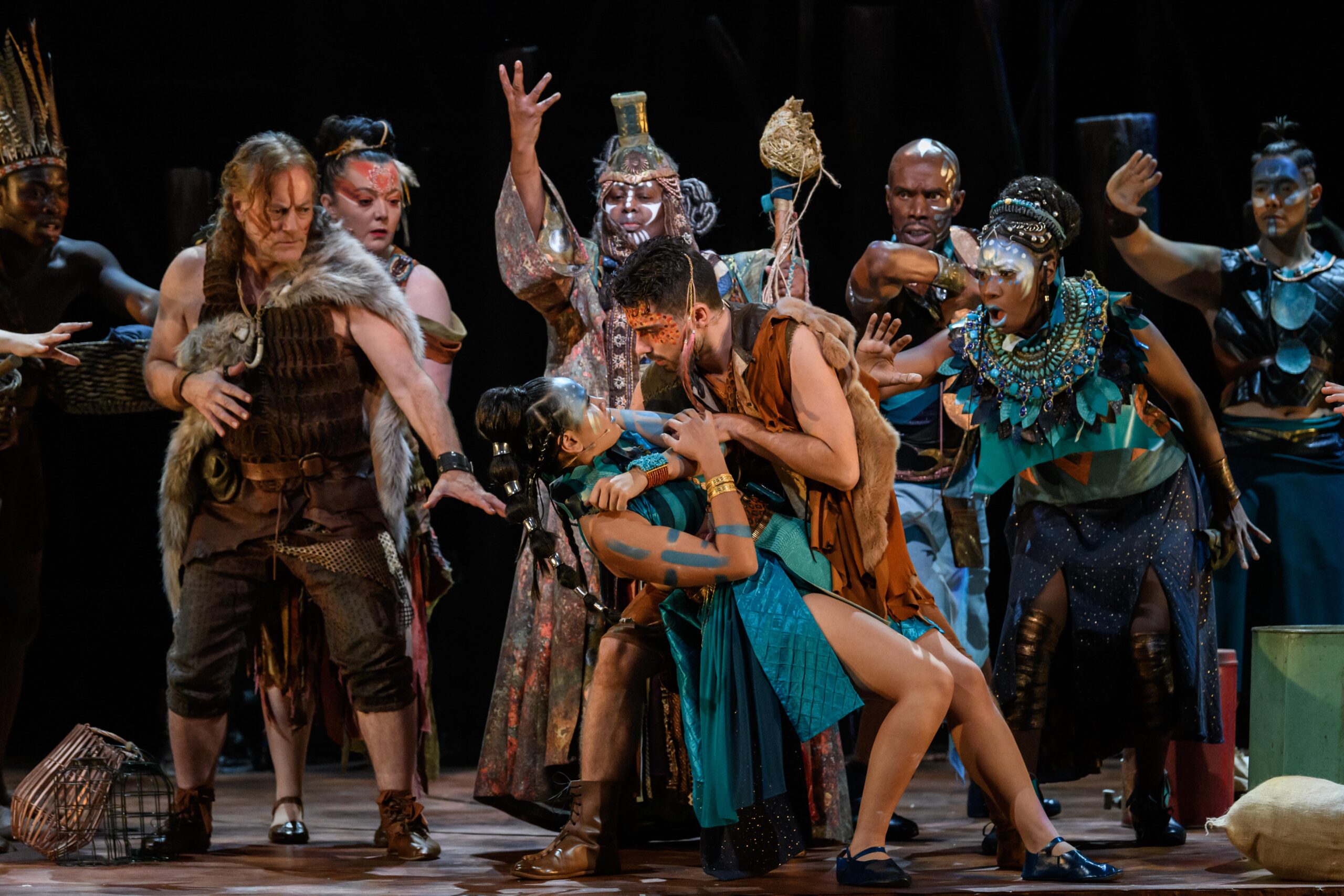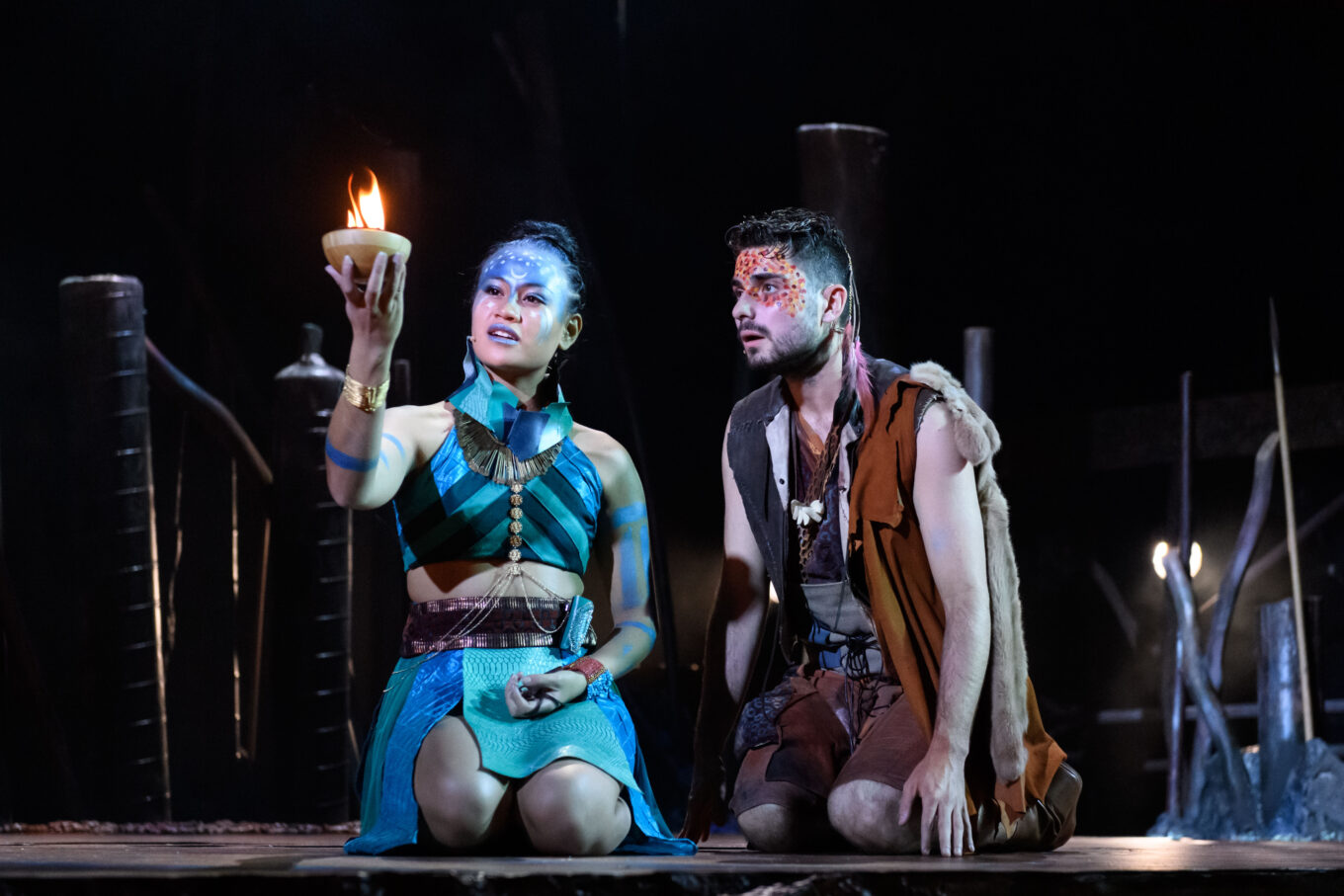ZOSIA KIBAŁO reviews Vanara: The Legend at the Hackney Empire, exploring its message of unity and togetherness.
Forest sounds echoed from the stage as I took my seat, my attention grasped by the paintings of Eloquence, Grace, Comedy and Music featured on the walls of the Hackney Empire. Walking into the auditorium, I was made a promise. A promise of an all-embracing experience, blending theatre, contemporary dance, and technical innovation.
Vanara: The Legend, produced by Oscar winner Giovanna Romagnoli and directed by Adam Lenson and Eleesha Drennan, is a musical set in a world where the human race barely survives as a result of greed and thoughtless expansion. Divided into two tribes, The Pana and The Kogallisk, humans live in constant unease, holding onto the last remaining forest as a symbol of peace and thanksgiving. However, with a long night of cold and darkness approaching, their reality crumbles (or is soon to crumble). Calling for unity and understanding, conflicted characters set out to sacrifice their past in order to protect their future.
The plot centres around a collective of individuals who struggle to fulfil their ‘duty’. At the heart of the story are the heirs to the conflicted tribes, Mohr (Jacob Fowler) and Ayla (Emily Bautista). Their chance encounter sparks a risky romance, confusing them both, as they have to choose between following in their parents’ footsteps and forging their own path. ‘Every rock, every stone has a reason, a right, every mind, every heart is a part of this dance. Every soul has its time. Every soul has its chance’, says The Oroznah (Johnnie Fiori), an elderly mystic and a protector of the forest. Although her words were usually dismissed as old folk tales, she attempts to make these peoples see their society as a complex, living organism that cannot survive without a mutual will to cooperate. She aims to convince them that it is precisely the celebration of their differences and unique perspectives that will lead them to a brighter future.

The importance of union between people is shown repeatedly throughout the musical, which explores themes of parental love, marriage, and friendship. In a moving performance, Mohr’s parents, Tahl (Glenn Carter) and Utza (Samantha Mercer), reflect not only on the beauty of those relationships but also the responsibility that comes with gaining someone’s trust. In the darkest times, when one feels like ‘the time slows down, and the world moves on without [them]’ having someone’s support can change the experience tremendously.Even though our individual voices are powerful enough to speak our truth, we need others’ support to be truly heard.
What really stood out throughout the show was Gianluca Cucchiara’s use of harmony. The voices of the cast blended perfectly together, patching up each other’s shortcomings, which could be heard in their solo performances. Either a choice or a brilliant coincidence, it fitted the narrative of sharing and understanding in the struggle to achieve peace and a better future. Moreover, sequences of contemporary dance, choreographed by Eleesha Drennan, pulled the audience into the turbulent nature of the characters’ lives. Flowing movements were reminiscent of a delicate breeze, suddenly chased by a whirlwind, serenity followed by terror. Dance served as a means to portray gradual change. The choreography slowly brought the tribes closer and closer together; the dancers formed two separate circles at the opening of the musical but danced in unison at the very end.
As the interval approached, I heard voices around me hum the songs of the past act. The melodies and lyrics stuck and resonated with the audience. It was especially Kayleigh McKnight’s performance, touching on a subject of heartbreak and unrequited love, that clearly moved so many. It was the contrast between her character,a strong-willed warrior, and the intense vulnerability that could be felt in her song which grasped the audience’s undivided attention. Her incredibly powerful voice, breaking on some of the lyrics, lingered in my ears long after the performance.

Alongside the brilliant Emily Bautista playing the role of Ayla, Jacob Fowler made his professional stage debut as Mohr. Although his performance was not flawless, his portrayal of Mohr showed the potential for his theatrical growth. His hesitation and initial timidness, made apparent through his hushed voice and the mumbling of some lyrics, was quite noticeable. However, luckily enough, it fitted his character. The only performance that fell short of my expectations was that of Johnnie Fiori in the role of The Oroznah. A supposed entity, the all-knowing presence seemed to rely too heavily on the script. Similarly, to how the characters refused to see the Oroznah as anything else than a crazy old woman, I could not see Johnnie Fiori as anything but herself, an actress.
‘After the night, the light always comes’. These words have stuck with me since the night of the show. Even though Vanara is not set in our reality, its call for unity in trying times hits very close to home. The show uses simplistic tactics to advocate for what the creators believe humanity needs right now. The well-known narratives featured create a prevailing message of hope and trust in the power we hold as a collective in deciding how our future will look. Although not a revolutionary production, it spoke to the audience by satisfying their need to escape from reality while providing a hopeful message and a brighter look into the future.
Featured Image courtesy of Jane Hobson.





